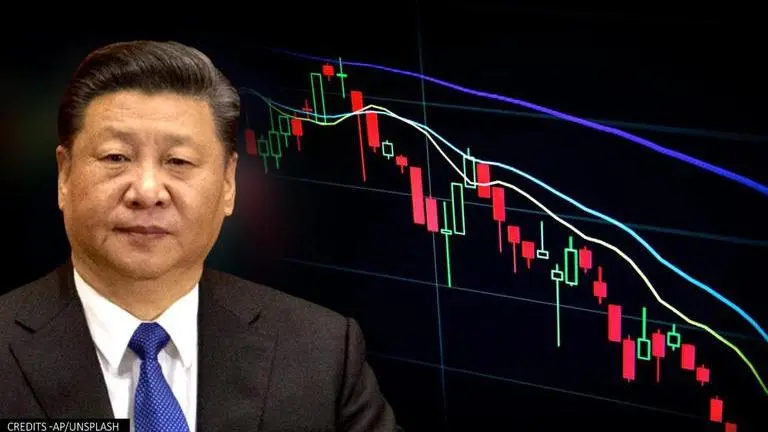Updated 30 July 2021 at 00:21 IST
In China, Tencent, Meituan, Alibaba & others' value eroded as Xi Jinping's govt runs amok
As per Chinese authorities, the crackdown is to regulate internet companies that disrupt market order, threaten data security or regulate consumers' rights
- Republic Business
- 4 min read

The technology giants in China are having the most unfortunate time as President Xi Jinping's expanding crackdown on the once-booming sector has resulted in a combined wipeout of $600 billion, fueling investors concerns. Tencent, Alibaba Group, Meituan and Pinduoduo are just a few who have faced the wrath of the Communist government, for a variety of made-up reasons.
According to China, the crackdown is to regulate Internet companies that disrupt market order, threaten data security or regulate consumers' rights. The clampdown has extended to businesses once viewed as home-grown champions.
China makes Tencent world's 'worst stock'
After grounding (and house-arresting?) Alibaba's Jack Ma, Jinping turned the focus to other tech startups and billion-dollar companies. Tencent Holdings Ltd, which was once considered an internet mogul, became the world's biggest stock loser this month. The Shenzhen-headquartered company's shares fell 23 per cent in July as of Wednesday, July 28, evaporating $170 billion of market value. The sell-off intensified after Jinping and his right hand Liu He, vice-premier of the Public's Republic of China, broadened the crackdown to include once emerging industries such as private education.
The bearish turn comes after China said that it would bar Tencent from holding exclusive music copyright, a move they believe will help small competitors. The Chinese giant was also fined for unfair market practices in the online streaming music market.
Whip cracked on online education providers
The whip was more agonising on private-tutoring and online education sector who were ordered to become non-profit. Larry Chen, who was once among the world's richest people, lost his billionaire status as Communist Jinping released new regulations that ban firms that teach school curriculums from making gains, raising Capital or going public. Chen, the founder and CEO of Gaotu Techedu Inc., is now only worth $336 million as the shares fell 98% since late January. In a statement on Chinese Twitter-alternate Weibo, Chen said Gaotu "will comply with the regulations and fulfil social responsibilities."
Advertisement
TAL Education Group also witnessed a downfall as the share tumbled 71%. The company's CEO Zhang Bangxin's wealth fell by $25 billion to $1.4 billion. Chairman of New Oriental Education & Technology Group Inc was not new to China's harshest-ever curbs. He also lost his billionaire status after his firm sank 54%, leaving him with a stake value of just $579 million.
Food delivery sector also caught in regulators' jaws
The online food ordering sector, which was flourishing a few months back, also faced the fury of China's crackdown. Shares of Meituan dived 14% on Monday after Beijing issued new rules to protect drivers. Under new regulations, food delivery platforms will be required to ensure riders' income above minimum wage, relaxation in delivery deadlines and mandatory insurance. The shares of Alibaba, which owns the food aggregator Ele.me, also slipped 7.97%.
Advertisement
Food delivery platforms in the mainland have come under fire over their treatment of employees, especially drivers, with issues ranging from penalising them for late deliveries to low pay.
Potholes for Didi
Ride-hail company Didi Chuxing which once did more trips than Uber in China and later spread to Latin America and Africa is on the Chinese government's radar. On June 30, the company made a stupendous debut on the New York Stock Exchange and raise $4.4 billion, the largest for a Chinese firm since Alibaba in 2014.
However, two days later, the Xi Jinping administration launched an investigation into the service provider citing violations in collecting and using personal information. According to Bloomberg, the charges can range from hefty fines to a forced delisting. Following this, another agency pressed anti-monopoly fines over its mergers and acquisitions in the past.
Onslaught on Alibaba
Alibaba shares also plummeted 7% on Monday. Jack Ma's downfall began after he spoke against the Chinese' financial regulators in a public speech in October 2020. Ma's popularity outside China also didn't go well with Xi Jinping. The billionaire was forced to sell a Hong Kong-based daily 'The South China Morning Post' owing to its growing influence over public opinion. Alibaba was also fined a record 18.2 billion yuan (more than $2.75 billion) for abusing its market dominance.
Meanwhile, the recent onslaughts are a result of Xi Jinping's attempt to limit the rapidly-growing tech sector which is influencing public opinion.
Published By : Kamal Joshi
Published On: 30 July 2021 at 00:21 IST
